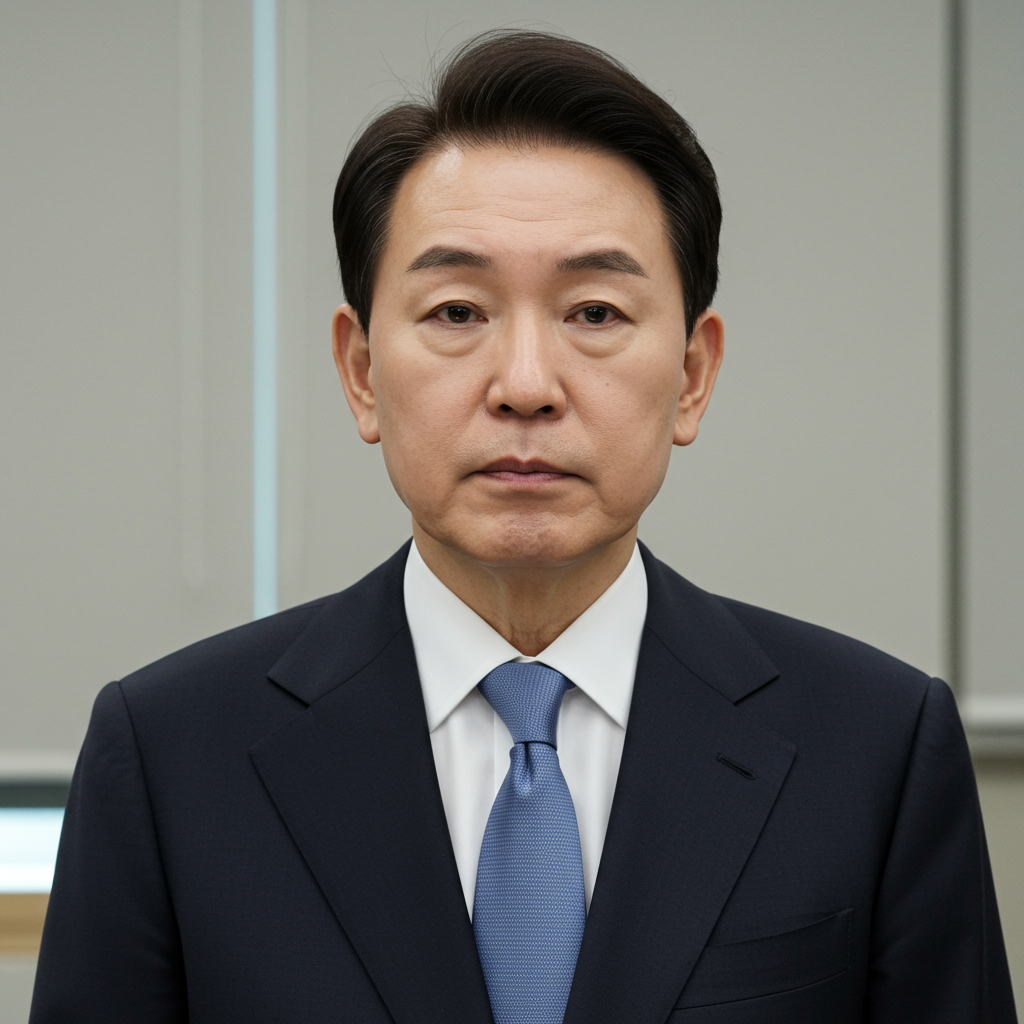Lee Jae-myung’s victory in South Korea’s snap presidential election was decisive, securing nearly 50% of the vote and signaling a strong public rejection of the attempted martial law by his impeached predecessor, Yoon Suk Yeol. Lee, a former human rights lawyer and politician with a compelling rags-to-riches backstory, takes office immediately, bypassing the typical transition period. While he campaigned on promises to strengthen democracy and unite a deeply divided nation, his immediate and most pressing challenge is a complex crisis shaped significantly by the potential actions and policies of former US President Donald Trump.
Unlike past leaders who had months to build their teams and refine their vision, President Lee is thrust directly into high-stakes negotiations. He inherits a turbulent political landscape, marked by the recent impeachment crisis and intense polarization, including ongoing legal challenges related to his own past. His win, viewed by many analysts as a reaction to perceived threats to democracy and a demand for accountability rather than solely an endorsement of his specific agenda, means he faces the daunting task of unifying a country still reeling from political upheaval and deep ideological rifts.
Economic Threats Loom Large
One immediate front in this “Trump-shaped crisis” is the economy. Voters have signaled that fixing the economy is their number one priority. South Korea’s economy was already slowing, further constricted by the domestic political chaos, and even contracted in the first quarter of the year.
Adding significant pressure, Trump has signaled a willingness to impose aggressive trade measures. In April, he levied a potentially devastating 25% tariff on all Korean imports, building on earlier tariffs targeting key sectors like steel and cars. These moves surprised many South Koreans who expected their status as a longstanding military ally and holder of a free-trade agreement with the US to offer protection. Experts warn that these broad tariffs, if fully implemented, could trigger an economic crisis. Addressing this requires urgent talks with the US, leaving Lee with little time to ease into his role. He has already activated an emergency economic task force, underscoring the severity of the situation.
Security Dilemmas and Shifting Priorities
Beyond trade, the crisis extends to South Korea’s fundamental security relationship with the United States. For decades, the US has guaranteed South Korea’s defense against nuclear-armed North Korea, maintaining 28,500 troops on the peninsula. This alliance has been a bedrock of regional stability.
However, Trump has explicitly linked economic and security considerations, suggesting Seoul isn’t contributing enough in either area. He has described this approach as “beautiful and efficient one-stop shopping,” indicating that discussions about trade tariffs include demands for increased payment for US military protection. This linkage makes South Korea uniquely vulnerable, raising fears among veteran diplomats. As former senior US diplomat Evans Revere noted, for the first time in memory, the US may have a president who doesn’t feel a strong moral and strategic obligation towards Korea. During his first term, Trump questioned the value of US forces and threatened withdrawal unless South Korea paid more; he is expected to revive these demands.
Adding complexity, US strategic priorities in Asia appear to be shifting. While South Korea can likely afford higher payments, the issue may no longer be solely financial. Washington’s focus is increasingly on containing China’s growing military ambitions, particularly regarding Taiwan, alongside deterring North Korea. A senior US defense official, Elbridge Colby, has stated South Korea may need to take “overwhelming responsibility for its own self-defence against North Korea” to free up the US to counter China. This could mean US troops in Korea shifting their focus or potentially even thousands being withdrawn and redeployed, requiring Seoul’s military to play a role in deterring Beijing.
Navigating US-China Geopolitics
This strategic pivot presents a significant diplomatic challenge for President Lee. Historically, he has shown skepticism towards the US alliance and seeks to improve relations with China, South Korea’s powerful neighbor and crucial trading partner. He has stated that South Korea should “keep our distance from a China-Taiwan contingency” and maintain good relations with both powers, aiming to avoid being caught in the middle of a potential US-China conflict.
This stance creates a delicate balancing act. As advisor Moon Chung-in articulated, South Korea worries about being abandoned by the US while simultaneously fearing being “entrapped in American strategy to contain and encircle China.” Some figures within Seoul’s political sphere have even suggested the possibility of asking US forces to leave if pressured by the US to take sides. This confluence of President Lee’s foreign policy leanings, Trump’s transactional approach, and the escalating US-China rivalry risks creating what Revere termed a “perfect storm,” potentially undermining peace and stability in Northeast Asia.
North Korea’s Increased Leverage
Further complicating the landscape is North Korea. Leader Kim Jong Un is undoubtedly observing the potential cracks in the US-South Korea alliance and the shifting US focus. Kim’s nuclear weapons program is more advanced and dangerous than ever, and international efforts, including past talks with Trump, have failed to halt its progress. Sanctions pressure, once a key leverage point, has significantly weakened, partly due to Russia’s economic and military support for Pyongyang in exchange for aid in the Ukraine war.
Trump, who made history by being the first US president to meet a North Korean leader, has indicated a desire to resume talks, which broke down in 2019. There are significant concerns in Seoul that a new “America First” deal could prioritize US security interests (like stopping intercontinental ballistic missiles threatening the US mainland) while neglecting the multiple short-range nuclear weapons pointed directly at South Korea. With increased leverage, Kim could demand major concessions, potentially including US acceptance of North Korea as a nuclear state, a deal allowing a reduced arsenal rather than full denuclearization, or even the removal of US security provisions, including troops. Sydney Seiler, a former US negotiator, warns that Kim is “in the driver’s seat” and that the idea of troop withdrawal being included in a deal is “really not that far-fetched.”
South Korea’s Potential Leverage
Facing these formidable challenges, South Korea is seeking ways to demonstrate its indispensable value to the US. One promising area is its world-leading shipbuilding industry, second only to China. With the US naval industry in decline, Seoul believes it can leverage its expertise to build, repair, and maintain warships for the US Navy.
Hyundai Heavy Industries’ massive shipyard in Ulsan, for example, produces dozens of vessels annually, including naval destroyers. Officials there see this capability as a “strongest card” for negotiation, arguing that South Korea can help address US shipbuilding difficulties that impact American national security. By highlighting its strategic industrial capacity, Seoul hopes to convince Washington of its continued importance as a partner.
The Path Forward
President Lee’s immediate tenure will be defined by his ability to navigate these interlocking crises. Experts like Seiler advise him to quickly establish a relationship with Trump if talks materialize and insist on South Korea’s inclusion in any discussions regarding the peninsula. Revere suggests Lee prepare a compelling case demonstrating South Korea’s indispensability as an ally and the value of US investment in the relationship. Despite his campaign stance against rushing agreements, the urgency of the situation means President Lee may have no other choice than to engage swiftly and decisively to protect South Korea’s economic stability, national security, and delicate regional standing.
References
- https://www.bbc.com/news/articles/cpvkxxerln1o
- https://www.bbc.co.uk/news/articles/cpvkxxerln1o
- https://www.bbc.com/news/articles/cq549p1yd2eo
- https://www.bbc.com/news/articles/c4gepwxzeqgo
- https://nepalsamaj.com/en/south-koreas-new-president-has-a-trump-shaped-crisis-to-avert/




